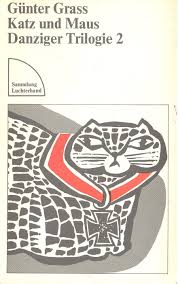We formed a triangle. My throbbing tooth went quiet – because Mahlke’s Adam’s apple, to the cat at least, had become all mouselike. The cat was so young, and that thing of Mahlke’s was bobbing like mad – in any case, the beast went for his throat. Or one of us grabbed the cat and dumped it on his neck. Or I did, with or without my toothache. Lured the cat over and showed it Mahlke’s mouse. And Joachim Mahlke screamed. And yet all he had to show for it were a few puny scratches.
(From Cat and Mouse, 1961. Translation mine.)
 Cat and Mouse takes place in Danzig, Günter Grass’s home city, a microcosm of greater Europe that affected his whole outlook, as a human being and as a writer. Our narrator Pilenz, as might be inferred from the extract above, is as unreliable as they come. He tells us anecdotes about Joachim Mahlke – school misfit, daredevil diver and champion masturbator. Between the cracks of his story, Hitler comes to power and the boys become soldiers. The cat is awake, the mouse is on the run. Outrages are perpetrated, speeches are made. But who was it that set the cat on Mahlke’s mouse?
Cat and Mouse takes place in Danzig, Günter Grass’s home city, a microcosm of greater Europe that affected his whole outlook, as a human being and as a writer. Our narrator Pilenz, as might be inferred from the extract above, is as unreliable as they come. He tells us anecdotes about Joachim Mahlke – school misfit, daredevil diver and champion masturbator. Between the cracks of his story, Hitler comes to power and the boys become soldiers. The cat is awake, the mouse is on the run. Outrages are perpetrated, speeches are made. But who was it that set the cat on Mahlke’s mouse?
Cat and Mouse was one of the first novels I read by a major European author and quietly, devastatingly it transformed my vision, my ideas about what a book might be for. Grass’s language, or rather Pilenz’s, with its odd angularities and unintentional acts of poetry, was something of a struggle for me at first, its complexities hidden, as the language of teenagers often is, by a looseness of expression that can be hard to decipher. But once I fell into its rhythm I found myself entranced, horrified, aghast at what was happening, among this group of boys in Danzig and in the world beyond. This short novel, which I read for the first time more than thirty years ago, has stayed with me, taut as a scar, right through to the present, and I love it dearly. I loved The Tin Drum after it, and then another Danzig novel, the quietly moving Unkenrufe. I bought and read Im Krebsgang when it first came out, in 2002, and although it lacked the youthful urgency and rawness of Katz und Maus (as of course it would) I found it to be a blistering, brilliant, deeply angry novel that inspired and affected me in equal measure.
You might not always agree with Günter Grass, but who the hell cares. Grass’s commitment to life, to the act of writing, to literature, to the personal search for truth and the unearthing of unwelcome but necessary realities remained absolute. He was everything a Nobel laureate should be. He increased the sum of who we are by what he wrote, even when what he wrote veered wildly off-beam. I love him for the example he set us, as writers, in always treating the words we choose to set down with the utmost seriousness. He rocked my world and I’ll never forget that.
An era is over.